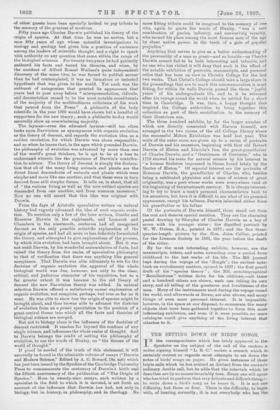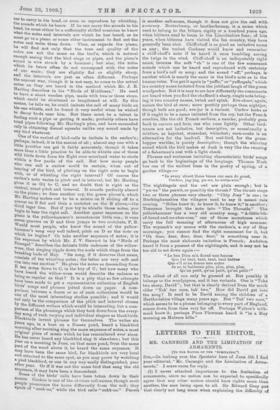THE SETTING DOWN OF BIRDS' SONGS,
IN the correspondence which has lately appeared in the Spectator on the subject of the call of the cuckoo, a writer signing himself " L. E. C." makes a remark which is certainly correct as regards most attempts to set down the notes of birds' songs on paper. He gives instances of three triple calls which he has noticed as distinct from the cuckoo's ordinary double call, but he adds that the intervals which be describes are by no means invariably true. Every one will agree who has tried to perform that very delicate and difficult thing,— to write down a bird's song as lie hears it. It is not one difficulty, but three or four. There is the difficulty, to begin . with, of hearing correctly ; it is not everybody who has the ear to carry in his head, or even to reproduce by whistling, is another call-name, though it does not give the call with the sounds which lie heave. If he can carry the sounds in his accuracy. Butterbuinp, or bootherboomp, is a name which head, he must either be a sufficiently skilled musician to know used to belong to the bittern eighty or a hundred years ago, what the notes and intervals are which he has heard, or he when bitterns used to boom in the Lincolnshire fens; of late must go to a piano or some other instrument to find out the years, when bitterns have visited the fen country, they have notes and write them down. Then, as regards the piano, generally been shot. Cliff-chaff is as good an imitative name he will find not only that the tone and quality of the as any ; the veriest Cockney would know and remember notes AM not the same as the bird's, which is natural a chiff-chaff's note if he beard it once tumbling among enough seeing that the bird sings or pipes, and the piano's the twigs in the wind. Chiff-chaff is an indisputably right Bound is wire struck by a hammer ; but also, the notes name, because the soft "oh" is one of the few consonant which he hears often do not correspond with the notes sounds which can be heard and reproduced with certainty of our scale ; they are slightly flat or slightly sharp, from a bird's call or song; and the sound " aff," perhaps, is and the intervals are just as often different. Perhaps another which is nearly the same in the bird's note as in the the nearest way, though it is not easy, to come to the actual human voice, You get it again in "yaffie," or "gala/gale," which notes as they are heard is the method which Mr. J. E. is a country name imitated from the jubilant laugh of the green Harting describes in his "Birds of Middlesex." He used woodpecker. But it is easy to see how differently the consonants to have a short wooden pipe, made with two or three stops, are beard when you find the chaffinch's sharp, single cote bring- which could be shortened or lengthened at will. By this ing it two country names, twink and opink. Eve-churr, again, means, he tells us, he could imitate the call of many birds oil names the bird at once; more prettily perhaps than nightjar, his one whistle, and he found it very useful when he wished though both are good; eve-jar is a variant. Curlew looks as to decoy birds near him. But there must be a talent in if it ought to be a name imitated from the cry, but the French finding such a pipe or getting it made; probably others have courliea, like the old French corlieus, a courier, probably goes tiled pipes following Mr. Harting's plan, and have succeeded back to currere and Levis, one who runs lightly. Other bird- only in obtaining dismal squeaks unlike any sound made by names are not imitative, but descriptive, or occasionally a any bird whatever, mixture, as hayeliat, stonechat, whinchat; corn-crake is an One of the easiest of bird-calls to imitate is the curlew's; alternative for the landrail. But reel-bird, for the grass- Perhaps, indeed, it is the easiest of all ; almost any one with a hopper warbler, is purely descriptive; though the whirring little practice can get it fairly accurately, though it takes sound which the bird makes at dusk is very like the running
more than a little practice to be able to whistle one of those of a fisherman's reel with a light cheek.
wild birds down from his flight over moorland water to circle Phrases and sentences imitating characteristic birds' songs within a few yards of the call. But how many people go back to the beginnings of the language. Thomas Nash who can call a curlew could be certain, when out of has one of the earliest lines in the poetry of spring, of a hearing of the bird, of pitching on the right note to begin garden village :—
with, or of whistling the right interval ? Of course the "In every street these tunes our ears do greet, curlew's note varies in pitch and in interval, but Mr. Harting Cuckoo, jug-jug, pu-we, to-witta-woo." gives it as Ge to C, and no doubt that is right as the The nightingale and the owl are plain enough ; but is central, usual pitch and interval. It sounds perfectly absurd " pu-we" the peewit, or possibly the thrush P The thrush sings
on the piano; so does another cry, the green plover's, which two or three phrases very clearly. "Chip Joey" is one ; in Mr. Harting makes out to be a minim on B sliding off to a Buckinghamshire the villagers used to say it meant rain quaver on B flat and then a crotchet on the E above,—the coming. " Billee knew it; he knew it, he knew it," is another;
third leger line. But if you try to whistle those notes, you Tennyson brought the note into " The Throetle." The begin to hear the right call. Another queer sequence ou the yellowhammer has a very old country song, "A-little-bit- piano is the yellowhammer's monotonous little run; it runs of-bread-and-no-ehee-eese," one of those monotones which seven quavers on D and then jumps to two crotchets, F, E. carry the full meaning of afternoons of high summer.
Would most people, who know the sound of the yellow- The wryneck's cry comes with the cuckoo's, a cry of May hammer's song very well indeed, pitch on D as the note on mornings ; you cannot find the right consonant for it, but which he begins P Or take another sequence of notes; it is "Oh dear, dear, dear, dear, dear," is something near it. the sequence by which Mr. J. V. Stewart in his " Birds of Perhaps the most elaborate imitation is French; Audubon Donegal" describes the delicate little cadences of the willow- heard it from a peasant of the nightingale, and it may not be wren, that singing ripple down the scale which rings from the too old to set down again:— breaking buds of May. " Its song, if it deserves that name, "Le bon Dteu m's donnA une femme
consists of ten whistling notes ; the latter are very soft and Quo j'ai taut, tant, teat, taut battue run into one another." He gives the notes as descending from Qua s'il m'en donne une nutre E ten notes down to C, in the key of C; but how many who Qu'un petit, qu'un petit, qu'un petit I " lave heard the willow-wren would describe the cadence as phrases jotted down on paper. A com- the most interesting studies possible ; and it would Years ago, in a boat on a Sussex pond, heard a blackbird morning after morning sing the same sequence of notes, a most
original piece of music which be has remembered ever since. LETTERS TO THE EDITOR. Re has never heard any blackbird sing it elsewhere; but this _____......._
Year on a morning in June, on that same pond, from the same MR. CARNEGIE AND THE LIMITATION OF Part of the wood above it, he heard the same sequence. It ARMAMENTS.
may have been the same bird, for blackbirds are very local [To TIIR EDITOR OP T116 "SPsa'UTOa."1 wild birds down from his flight over moorland water to circle Phrases and sentences imitating characteristic birds' songs within a few yards of the call. But how many people go back to the beginnings of the language. Thomas Nash who can call a curlew could be certain, when out of has one of the earliest lines in the poetry of spring, of a hearing of the bird, of pitching on the right note to begin garden village :—
gives it as Ge to C, and no doubt that is right as the The nightingale and the owl are plain enough ; but is central, usual pitch and interval. It sounds perfectly absurd " pu-we" the peewit, or possibly the thrush P The thrush sings
on the piano; so does another cry, the green plover's, which two or three phrases very clearly. "Chip Joey" is one ; in Mr. Harting makes out to be a minim on B sliding off to a Buckinghamshire the villagers used to say it meant rain quaver on B flat and then a crotchet on the E above,—the coming. " Billee knew it; he knew it, he knew it," is another;
third leger line. But if you try to whistle those notes, you Tennyson brought the note into " The Throetle." The begin to hear the right call. Another queer sequence ou the yellowhammer has a very old country song, "A-little-bit- piano is the yellowhammer's monotonous little run; it runs of-bread-and-no-ehee-eese," one of those monotones which seven quavers on D and then jumps to two crotchets, F, E. carry the full meaning of afternoons of high summer.
Would most people, who know the sound of the yellow- The wryneck's cry comes with the cuckoo's, a cry of May hammer's song very well indeed, pitch on D as the note on mornings ; you cannot find the right consonant for it, but which he begins P Or take another sequence of notes; it is "Oh dear, dear, dear, dear, dear," is something near it. the sequence by which Mr. J. V. Stewart in his " Birds of Perhaps the most elaborate imitation is French; Audubon Donegal" describes the delicate little cadences of the willow- heard it from a peasant of the nightingale, and it may not be wren, that singing ripple down the scale which rings from the too old to set down again:—
Jo la batterais plus, plus, plus, plus, The oldest of all can only be guessed at But possibly it
being so regular as that? It is a pity that so few attempts . have been made to get a representative collection of English belongs to the woodpigeon, and it has variants. One is "Take'
birds' Songs and two sheep, David"; but that is clearly derived from the much parison between a dozen or so of such collections would be older "Tak' two coos, tak' two." How did David get into
one of the song ? It used to be David among the children of a
not only be the comparison of the pitch and interval chosen Hertfordshire village many years ago. But " Tak' two coos,"



























































 Previous page
Previous page